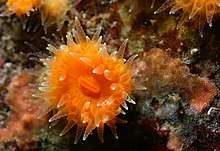Balanophyllia elegans
Balanophyllia elegans, the orange coral or orange cup coral, is a species of solitary cup coral, a stony coral in the family Dendrophylliidae. It is native to the eastern Pacific Ocean. As an azooxanthellate species, it does not contain symbiotic dinoflagellates in its tissues in the way that most corals do.[1]
| Balanophyllia elegans | |
|---|---|
 | |
| Scientific classification | |
| Kingdom: | Animalia |
| Phylum: | Cnidaria |
| Class: | Anthozoa |
| Order: | Scleractinia |
| Family: | Dendrophylliidae |
| Genus: | Balanophyllia |
| Species: | B. elegans |
| Binomial name | |
| Balanophyllia elegans | |
Description
B. elegans is a solitary species of cup coral. The polyps are mostly bright orange and about 1 cm (0.4 in) in diameter,[2] though a yellow form also exists. The polyp is large and fleshy with tapering tentacles bearing groups of stinging cells. The polyp can almost completely retract into its stony corallite cup.[3] This coral can be distinguished from the corallimorph Corynactis californica, which it somewhat resembles, by its stony skeleton,[4] and from Caryophyllia alaskensis, another stony coral found in this habitat, by its brighter colour (C. alaskensis is beige).[2]
Distribution and habitat
The species is native to the western seaboard of North America, from British Columbia to Baja California. It occurs on rocky coasts from the low intertidal zone down to about 290 m (950 ft). It appreciates habitats with vigorous water movement, such as surge channels, and often grows in caves and under overhangs.[1][4] It is often found living amongst kelp such as Macrocystis integrifolia.[5]
Biology
Being an azooxanthellate coral, that is, not containing symbiotic dinoflagellate algae that photosynthesise, B. elegans feeds on whatever the tentacles can catch, with the aid of their nematocysts (stinging cells) and spirocysts (cells containing hollow adhesive threads which coil around the prey). The mouth is large and slit-shaped, and it is possible that some prey is caught by use of the mesenteries in the gastrovascular cavity while opening the mouth wide,[2] however its main prey is zooplankton caught by the tentacles. This coral can also extract dissolved organic carbon from sea water, and during the winter months, when there is a scarcity of zooplankton, this source of nutrition may be critical for the coral's survival.[5]
The sexes are separate in this coral. Fertilisation takes place inside the female's gastrovascular cavity, and the larvae are brooded there. They are later released as worm-like orange larvae and settle nearby.[3]
References
- Hoeksema, Bert (2017). "Balanophyllia (Balanophyllia) elegans Verrill, 1864". WoRMS. World Register of Marine Species. Retrieved 18 September 2017.
- Cowles, Dave (2005). "Balanophyllia elegans Verrill, 1864". Retrieved 18 September 2017.
- Brueggeman, Peter. "Orange cup coral: Balanophyllia elegans". Retrieved 19 September 2017.
- Light, Sol Felty (2007). The Light and Smith Manual: Intertidal Invertebrates from Central California to Oregon. University of California Press. p. 183. ISBN 978-0-520-23939-5.
- Mackie, G.O. (2013). Coelenterate Ecology and Behavior. Springer Science & Business Media. pp. 110–115. ISBN 978-1-4757-9724-4.
External links
